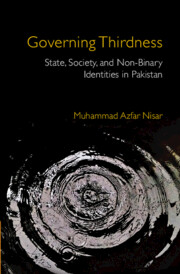Book contents
Part III - Bureaucratic Governance
Published online by Cambridge University Press: 10 December 2021
Summary
It seems to me that the real political task in a society such as ours is to critique the working of institutions which appear to be both neutral and independent, to criticise them in such a manner that the political violence which has always exercised itself obscurely through them will be unmasked so that one can fight them. (Foucault and Chomsky 2006, 41)
While we often focus on what is written in laws and policies as an indicator of citizenship and rights of different groups, frontline offices of the government are the major sites where the classification regimes of the government actually come to fruition. From categorization at birth (through the birth certificate) to issuance of official identity (cards) and eligibility for various services of the state, frontline workers make most decisions that influence the lives of marginalized groups in many significant ways. This happens because identity in contemporary states is formed only when a citizen passes through the obligatory (bureaucratic) passage points (Callon 1986; Hardy 2003). Hence, the interaction between citizens and street-level bureaucrats—members of bureaucracy who directly deal with the public—represents this critical juncture where formal rules intersect with social power relations to form realized public policies.
The paradigmatic case of the classifying role of frontline bureaucrats is illustrative in this regard: Who gets classified as deserving and who does not—though partly determined by official policy (Schneider and Ingram 1993)—is influenced to a great degree by the choices of the frontline bureaucrats of different government departments. While one individual is given a verbal warning, another is given the full financial penalty under the given law for committing the same transgression (Epp, Maynard-Moody, and Haider-Markel 2014). Similarly, individuals applying for social welfare might be classified differently on the deserving–undeserving axis based on the discretion of the frontline workers (Maynard-Moody and Musheno 2003; Schram, Fording and Soss 2009). Frontline workers may also withhold services from transgender individuals considered ‘not normal’, sometimes with deadly consequences (Fernandez 1988; J. K. Taylor 2007). These multiple bureaucratic agential cuts (Barad 2003) influence individuals not just by defining who they are and what is socially acceptable but also by limiting and defining the possibilities open to them in life.
- Type
- Chapter
- Information
- Governing ThirdnessState, Society, and Non-Binary Identities in Pakistan, pp. 115 - 119Publisher: Cambridge University PressPrint publication year: 2022



